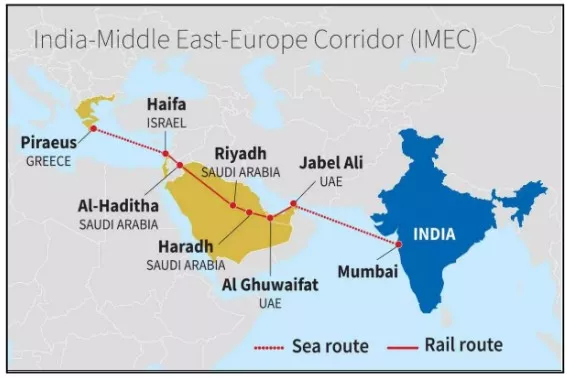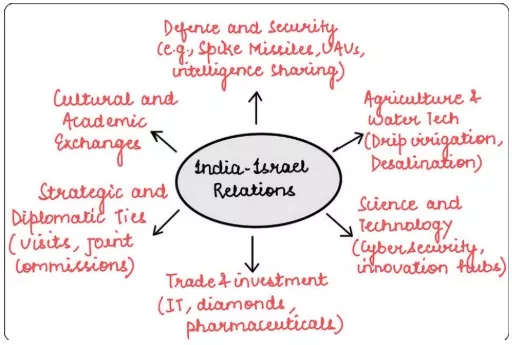Israel’s Foreign Minister, Gideon Sa’ar is on a three-day visit to India. External affairs minister S Jaishankar met with the Israeli foreign minister in New Delhi.
- The 17th India–Israel Joint Working Group (JWG) Meeting on Defence Cooperation was held in Tel Aviv, Israel co-chaired by Defence Secretary of India and Director General of the Israeli Ministry.
Foreign Ministers’ Dialogue – New Delhi

- Counter-Terror Cooperation: India and Israel agreed to intensify efforts to counter global terrorism and promote a “zero-tolerance” approach to all forms of terror.
- Discussion on Gaza Peace Plan: Both sides supported ongoing peace efforts in Gaza and emphasized the need for lasting regional stability.
- Expansion of Economic and Technological Ties: Talks included cooperation in trade, infrastructure, renewable energy, semiconductors, and cybersecurity.
- Support for Connectivity Initiatives: India and Israel reaffirmed their commitment to the India–Middle East–Europe Economic Corridor (IMEC) and the I2U2 partnership.
India–Middle East–Europe Economic Corridor (IMEC)
- It was formally announced on the sidelines of the G20 Summit in New Delhi (September 2023), endorsed by major partners including France, Germany, and Italy, marking India’s leadership in building a rules-based connectivity network.
Design and Structure of IMEC
- The IMEC is conceived as a multi-modal connectivity framework combining maritime, rail, digital, and energy networks.
- Eastern Corridor: Links India’s western ports — Mundra, Kandla, JNPT — with UAE ports (Fujairah, Jebel Ali, Abu Dhabi).
- Northern Corridor: Connects Gulf ports to the Haifa Port (Israel) via Saudi Arabia and Jordan, and onward to Piraeus (Greece) and other European destinations.
- Key Components:
-
- High-speed freight railway network.
- Green hydrogen and electricity pipelines.
- Undersea digital cable for data connectivity.
- Upgraded port and logistics infrastructure.
The I2U2 Group
- I2U2 stands for India, Israel, the UAE, and the US.
- The group was first conceptualised in October 2021, during a meeting of the foreign ministers of the four countries in Israel.
- Aim: To discuss “common areas of mutual interest, to strengthen the economic partnership in trade and investment in our respective regions and beyond”.
- Six areas of cooperation have been identified by the countries mutually, NamelyWater, Energy, Transportation, Space, Health, and Food security.
|
| 17th India – Israel Joint Working Group (JWG) Meeting – Tel Aviv, Israel
Signing of a Defence Cooperation MoU: The MoU provides a unified vision and policy direction to deepen defence ties.
- Promotion of Co-development and Co-production: The MoU enables joint initiatives for developing and producing advanced defence technologies.
- Expanded Areas of Collaboration: Both sides agreed to enhance cooperation in strategic dialogues, defence industry, R&D, artificial intelligence, cybersecurity, and technological innovation.
- Focus on Counter-Terrorism: The JWG reaffirmed mutual commitment to combating terrorism and addressing shared security threats.
- Strengthening Strategic Partnership: The meeting reinforced India–Israel defence relations based on mutual trust, shared interests, and long-term cooperation.
|
Timeline of India-Israel Relations
- 1947: India opposed the partition of Palestine at the UN, rejecting the idea of creating separate nations based on religious criteria.
- 1950: India officially recognized the existence of Israel.
- 1953: Israel opened a consulate in Mumbai, mainly for trade and visa services.
- 1950s–1980s: India maintained a pro-Arab policy under the Non-Aligned Movement (NAM) and in support of the Palestinian cause.
- Due to Cold War dynamics and a commitment to the Non-Aligned Movement (NAM), it did not establish full diplomatic relations
- Despite this, covert defence and intelligence contacts gradually developed, especially after the 1962 Sino-Indian War and the 1971 Indo-Pak war.
- 1992: India and Israel established full diplomatic relations.
| De-Hyphenation Policy
India explicitly adopted a “de-hyphenation” policy, asserting that its relationship with Israel is independent of its historical relationship with the Palestinians. |
- 2017: A major shift in India-Israel relations occurred with the Indian Prime Minister’s state visit to Israel, becoming the first Indian Prime Minister to do so.
- 2018: India voted in favor of a resolution presented by Turkey and Yemen at the UN, opposing the US decision to recognize Jerusalem as Israel’s capital.
- 2021: India abstained from voting on a resolution at the UN Human Rights Council to create a permanent commission to investigate human rights violations in Gaza, the West Bank, and Palestine.
Bilateral Investment Agreement (BIA)
In September 2025, Government of India and Government of the State of Israel sign Bilateral Investment Agreement (BIA)
- Israel becomes the first OECD (Organisation for Economic Co-operation and Development) country to adopt India’s updated investment-treaty model.
- Bilateral investments between India and Israel currently stand around US $800 million
Marks a strategic milestone in India–Israel economic ties, signalling a move from primarily defence/technology partnership to broader commercial integration. |
India-Israel Relationship: Key Areas of Cooperation
- Economic & Commercial Ties: Bilateral trade grew from US$ 200 million in 1992 (comprising primarily of diamonds) to US$ 10.77 billion (Excluding defense) in FY 2022-23 (Peak)
- India is Israel’s second-largest country partner in Asia for merchandise trade.
- Major Exports: Pearls and precious stones, automotive diesel, chemical and mineral products, machinery and electrical equipment, plastics, textile and apparel products, base metals and transport equipment, agricultural products.
- Major Imports: Pearls and precious stones, chemical and mineral/fertilizer products, machinery and electrical equipment, petroleum oils, defense, machinery and transport equipment.
- I2U2 Partnership: Formed in 2021, includes India, Israel, UAE, and the US.
- It aimed at promoting economic development, scientific innovation, and regional stability.
- Defense Cooperation: Israel is one of the top arms supplier to India, with collaboration on counter-terrorism.
- Over the past ten years, India has imported $2.9 billion worth of military hardware from Israel, including radars, surveillance and combat drones, and missiles
- Agricultural Cooperation: In 1993, the first Agreement on Cooperation in Agriculture was signed.
- 2006: Comprehensive Work Plan on Agriculture launched (3-year cycles) which is implemented through MASHAV (Israel’s Agency for International Development Cooperation).
Focus Areas of Agriculture Cooperation Agreement and Work Plan in the Horticulture Sector:
- Collaboration on food security, technology transfer, and quality seed development.
- Expansion of Centers of Excellence (CoEs) and implementation of the Villages of Excellence (VoE) model.
- Launch of a proposed Five-Year Seed Improvement Plan (FYSIP) to boost productivity and sustainability.
- Cooperation on pest management, capacity building, and post-harvest technologies.
- Strategic Vision: Both sides reaffirmed a shared goal to leverage innovation and R&D for agricultural resilience amid climate challenges.
- Israel showed keen interest in India’s Digital Agriculture Mission for farmer empowerment.
- Institutional Mechanism: Establishment of a Joint Working Group (JWG) to ensure continuous dialogue, goal setting, and monitoring of progress.
|

-
- 2025: A new Agriculture Cooperation Agreement and Work Plan in the Horticulture Sector were signed to strengthen bilateral ties in: Soil and water management, Horticultural and agricultural production, Post-harvest and processing technology, Agricultural mechanization, Animal husbandry and Research & Development
- Science & Technology: India-Israel cooperation in Science & Technology (S&T) is overseen by the Joint Committee on S&T, established under the Agreement of Science & Technology cooperation signed in 1993.
- I4F Fund promotes industrial R&D between India and Israel.
- The US$40 million India-Israel Industrial R&D and Technological Innovation Fund (I4F) was established in 2017 to foster joint industrial research and development projects between companies from both countries.
- Energy: India actively bids for exploration licenses in Israel’s Tamar and Levianthan gas fields. Indian firms ONGC Videsh and Indian Oil awarded exploration licenses.
- Cultural Exchange: Around 85,000 Indian-origin Jews live in Israel, contributing to cultural ties. Academic collaborations and joint research funding programs initiated.
Challenges in India-Israel Relations
- Relation with Iran: Israel views Iran as a threat, while India values cooperation with Iran for energy supplies and the Chabahar port route.
- Regional volatility, especially Israel-Hamas conflict (2023–25), forces India to adopt a cautious diplomatic tone, avoiding overt military endorsement.
- Energy Security: The conflict between Israel and Iran poses serious risks to India’s energy imports and regional connectivity projects, including the Chabahar Port and the India–Middle East–Europe Economic Corridor (IMEC).
- Disruptions in the Persian Gulf or Red Sea could directly impact India’s oil supply routes and strategic maritime interests.
- Balancing Relations with the Arab World: India’s West Asia policy has to balance ties between Israel and the Arab nations, including Iran and Palestine.
- India maintains support for the Palestinian cause and has deep energy, trade, and diaspora interests with Gulf countries.
- Any overt alignment with Israel (e.g., during Gaza conflicts) risks diplomatic friction with Arab partners crucial for India’s oil, remittances, and labour market.
- China Factor: China is Israel’s largest trading partner in Asia, complicating India-Israel relations due to Beijing’s strong tech and investment ties with Israel.
- Free Trade Agreement (FTA) Delays: Despite robust trade , there is no FTA yet between the two countries.
- This limits the scope for investment diversification beyond defence and diamonds.
- Security & Cyber Concerns: Incidents such as the Pegasus spyware controversy (2021) and suspected cyber espionage raise trust and privacy issues.
Way Forward
- Deepen Strategic Convergence: Build on the momentum of the 17th JWG by moving from buyer–seller defence ties to co-development and joint production, ensuring genuine technology transfer under Atmanirbhar Bharat
- Prioritize National Interests: India must balance its interests in the Middle East while maintaining flexibility in dealing with both Israel and Arab nations.
- Comprehensive Cooperation: A holistic approach to foster collaboration at governmental, business, and inter-business levels.
- Enhance Counter-Terror & Cyber Frameworks: Institutionalize joint intelligence sharing and cyber-security protocols to counter terrorism and data threats, ensuring transparency and trust.
- Increase People-to-People (P2P) Contact: Enhanced citizen engagement can deepen bilateral ties.
- Expand Trade Volumes: Despite growth, trade is still below potential. An FTA should be finalized to expand the trade basket.
- Balance Israel-Palestine Relations: India should strike a balance between its relations with Israel and Palestine to align with geostrategic and moral considerations.
- Strengthen People-to-People and Academic Ties: Foster collaboration between universities, research institutions, and start-ups to build a sustainable knowledge partnership beyond security domains.
- Utilize Multilateral Platforms: Use I2U2 and IMEC frameworks to promote regional connectivity, resilient supply chains, and shared innovation across West Asia.
Conclusion
India–Israel relations have evolved into a multifaceted strategic partnership rooted in defence, technology, and innovation, reflecting deep mutual trust and shared interests.
Going forward, a balanced and pragmatic approach will enable both nations to expand cooperation while safeguarding regional stability and India’s wider West Asia interests.
![]() 6 Nov 2025
6 Nov 2025




